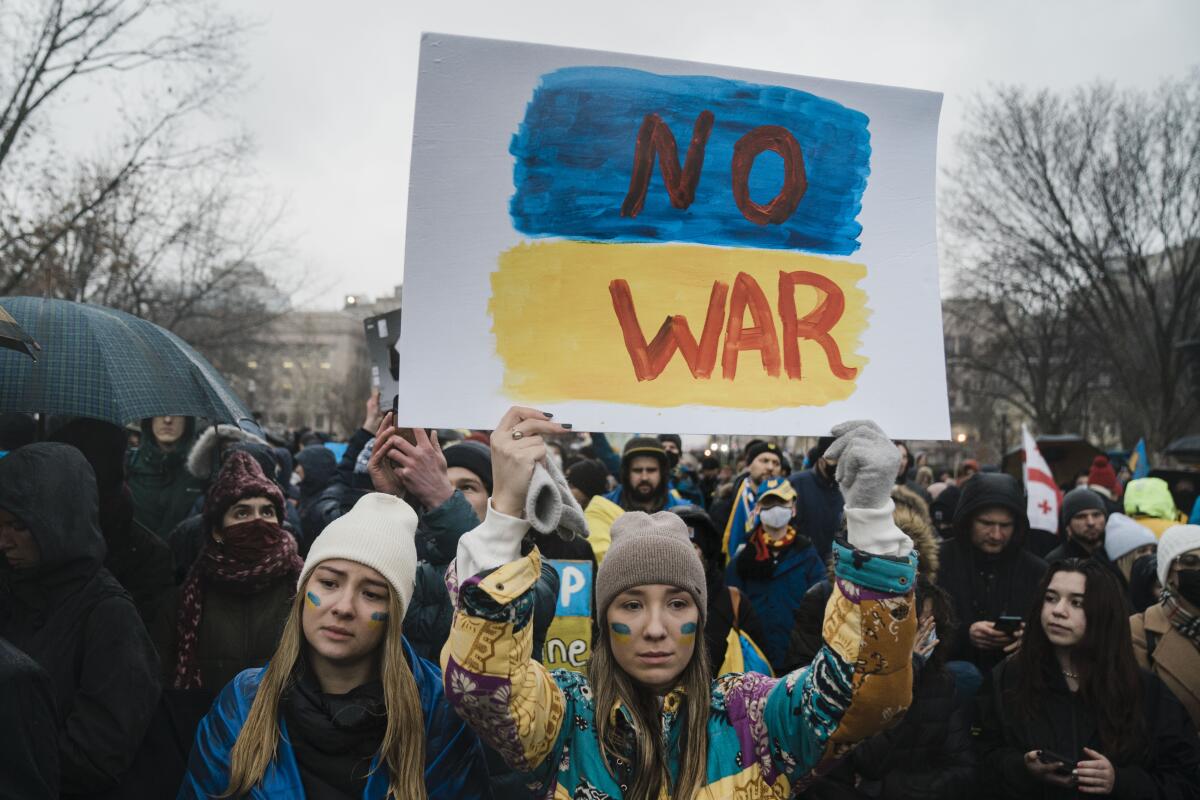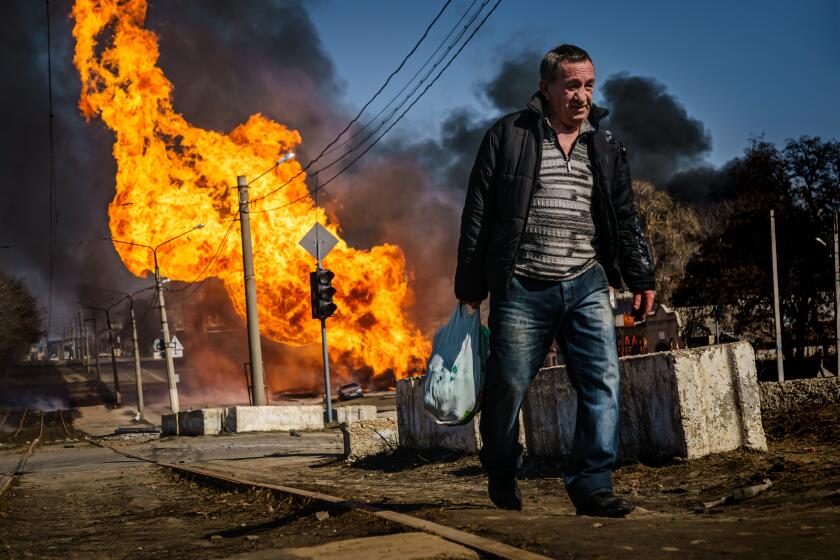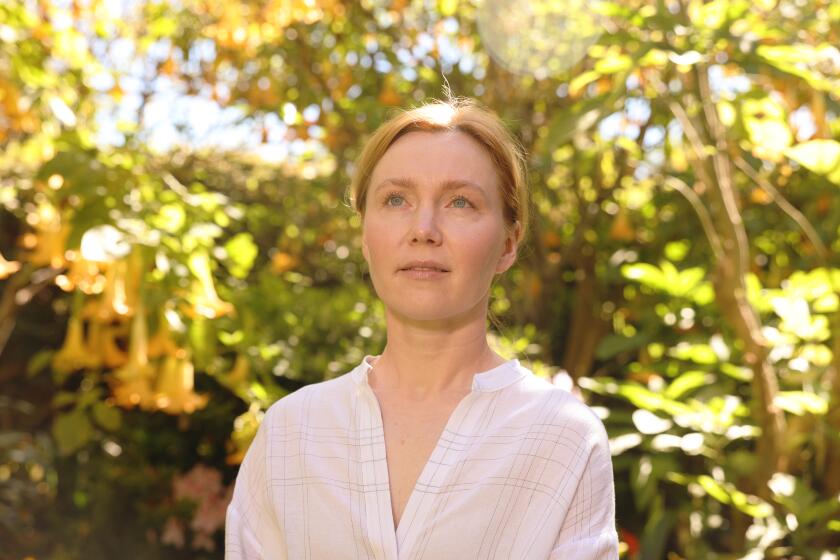Op-Ed: Speaking Russian doesnât make me a supporter of Putinâs war

While celebrating Purim with my family last week, I learned that our friend Daniel Lermanâs business has received 20-30 threatening calls and emails a day, as well as a cadre of negative online reviews. He owns Russian Universal Services, which helps Russian speakers complete legal documents. Daniel immigrated to Los Angeles from Kyiv in 1990 as a Jewish refugee and fervently opposes Russiaâs invasion of Ukraine. Heâs even hosting a Ukrainian refugee family heâd never met before in his home.
âTheyâre friends of friends,â he told me over the phone. âA mother and three kids who had nowhere to go, so I gave them my home. Their father is fighting for the Ukrainian army.â
Amid the constant threats, Daniel is spending thousands of dollars rebranding his business to erase all mentions of Russia; heâs renaming it Dokument USA.
Russian speakers all over the country are being targeted with hateful messages, with some instances escalating to bomb threats. Yet not all Russian speakers in America are Russian â many of us are Jewish refugees with roots in Ukraine, Moldova, Belarus and other post-Soviet states. And those who are from Russia seem to overwhelmingly oppose the war.
The Timesâ Marcus Yam, no stranger to war photography, gives a first-person account from Ukraine.
Though my politics are farther left than most of the former Soviet Union community, Iâve found this war to be the most uniting political issue of my lifetime for us. Those threatening Russian speakers in America are primarily targeting immigrants who left the former Soviet Union to escape state-sanctioned antisemitism, corruption and violence. Menacing a diasporic people for speaking the same language as those who oppressed them is embarrassingly ahistorical and does nothing to help those suffering in Ukraine.
Friends and acquaintances keep asking me: âSo, where does your family stand on the war?â I find myself proclaiming how outraged and heartbroken we are and how much we hate Vladimir Putin as though testifying before a jury. âMy great-grandfather was murdered by the KGB for teaching the Torah,â I tell my questioners. At this point, their expressions soften. Exposing our trauma convinces others of my loyalties. But why did they need to be convinced at all?
I was born in Moldova, where my motherâs family has roots for several generations. My fatherâs family is primarily from Ukraine. Yet, weâve never called ourselves Moldovan or Ukrainian, because to be Jewish in the Soviet Union was to be excluded from a national identity. Our birth certificates and passports simply said âJew.â
Upon our arrival in the U.S., people began calling us âRussianâ â a lazy catchall for anyone who primarily spoke the lingua franca of the Soviet Union. Until now, Iâve found it easier to wear the label than to explain how Russian imperialism brutally suppressed other languages, cultures and identities, and how many ethnic Russians did not accept minorities as their own. Putin has partly justified his war on the same denial of Ukrainiansâ agency and identities, going so far as to claim he is denazifying the increasingly pluralistic country.
I find myself bristling at the thought of others determining my identity for me based on the language that I speak. My ties to Russia are remote â I have just one grandparent who was born there.
The nature of diaspora, of living between worlds with no discrete place to call home, makes it difficult to determine how I do want to identify. Diasporic peoples are intimately aware that being from a place does not make you of a place. âPost-Soviet American Jewâ feels closer to how I identify at the moment, but it doesnât reflect the way my immigrant community is often perceived as uniformly Russian.
Members of Californiaâs Russian diaspora have found themselves thrust into the center of the Ukraine war thousands of miles away.
Being othered is exhausting. My father was recently told by a colleague to call his âfriend Putin and ask him to stop the war.â That this was intended as a joke is cold comfort. Unlike his non-Jewish peers, my father was forced to serve in the Soviet army â the scars of which are still visible when he wears short sleeves â to be eligible for one of the few medical school spots open to Jews. âPutin may not listen to my opinion because I was born in Ukraine,â my father responded, with more tact than the joke deserved.
Post-Soviet immigrants are used to being called Russian spies, alcoholics and mail-order brides. And being told our names are unpronounceable. But Russian speakers are not a monolith, and weâre certainly not an extension of Putinâs government.
We hurt for the people of Ukraine and for the Russians who oppose this war. We call our friends and family in Russia, who are too fearful to speak about what theyâre experiencing in case their phones are tapped. We talk about the weather, grateful to hear their voices at all. We spend our days providing money and resources to those trying to evacuate the region and petitioning the U.S. government to welcome all refugees, as we once were.
Ruth Madievsky is a writer and clinical pharmacist in Los Angeles. Her debut novel, âAll-Night Pharmacy,â is forthcoming.
More to Read
A cure for the common opinion
Get thought-provoking perspectives with our weekly newsletter.
You may occasionally receive promotional content from the Los Angeles Times.












